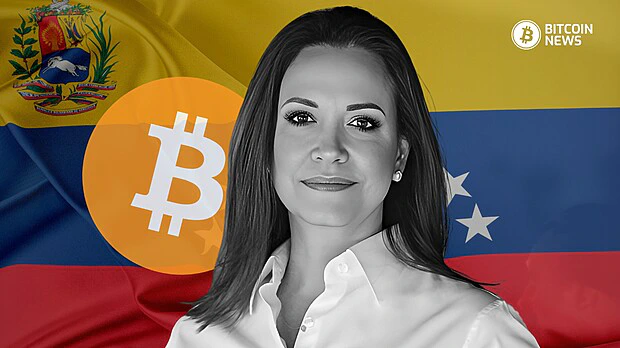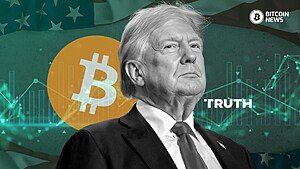Amid Venezuela’s severe economic crisis, opposition leader María Corina Machado has made a bold proposal: using Bitcoin (BTC) as a national reserve asset.
Her suggestion comes at a time when the country is grappling with hyperinflation, currency devaluation, and economic instability under the regimes of former President Hugo Chávez and current President Nicolás Maduro.
Machado sees Bitcoin as a vital tool to help Venezuela recover and rebuild its economy.
In a recent interview with Alex Gladstein, Chief Strategy Officer of the Human Rights Foundation (HRF), Machado highlighted the dire state of the country’s economy.
She explained that years of financial mismanagement have caused the national currency, the bolívar, to lose 14 zeros, with inflation reaching a staggering 1.7 million percent in 2018.
According to Machado, “This financial repression rooted in state-sponsored looting, theft, and unchecked money printing” has crippled the economy despite Venezuela’s vast oil wealth.
Machado emphasized that many citizens have already turned to bitcoin as a way to escape hyperinflation, protect their wealth, and even fund their escape from the country.
She described Bitcoin as a “lifeline” for Venezuelans, a way to bypass government-controlled exchange rates, and maintain some level of financial stability. She stated:
“Bitcoin bypasses government-imposed exchange rates and helps many of our people… It has evolved from a humanitarian tool to a vital means of resistance.”
Machado’s proposal to use bitcoin as a national reserve asset reflects a growing trend among global leaders to explore bitcoin as potential stabilizers for national economies.
Related: Senator Lummis to Propose Bitcoin Reserve Bill at Nashville Conference
Related: Hong Kong Legislator Advocates for Strategic Bitcoin Reserves
She believes that incorporating bitcoin into Venezuela’s reserves could provide a measure of stability and transparency to a country that has suffered from severe financial instability.
By adopting bitcoin as a reserve asset, Machado envisions a way to mitigate the adverse effects of hyperinflation and restore confidence in Venezuela’s financial system. “We envision Bitcoin as part of our national reserves, helping rebuild what the dictatorship stole,” she said.
This approach would not only help stabilize the economy but could also signal a commitment to economic innovation and a willingness to explore unconventional solutions to longstanding challenges.
Machado’s proposal comes alongside a new global campaign to raise funds in bitcoin to support the Venezuelan opposition. Launched by the Human Rights Foundation (HRF), this campaign aims to support efforts for a peaceful political transition in Venezuela.
“Donate Bitcoin today to help María Corina Machado and the Venezuelan opposition in their fight for democracy in Venezuela,” reads the campaign’s website.
The HRF is a nonprofit organization known for its work in promoting human rights globally, including providing grants and financial support to those advancing the development of Bitcoin.
HRF states that the funds raised through this campaign will go directly to supporting human rights defenders in Venezuela who are working towards a peaceful transition.
Machado’s proposal has been compared to former US President Donald Trump’s recent endorsement of a national bitcoin stockpile.
While Trump’s idea focuses on using bitcoin as a strategic reserve asset to address the US national debt, Machado’s proposal aims to offer immediate relief to the south American country’s economic struggles.
The two approaches share similarities in their intentions to leverage Bitcoin’s potential benefits but differ in their political and economic contexts.
The idea of using bitcoin as a national reserve is not unprecedented. El Salvador, for example, made headlines by adopting bitcoin as legal tender, becoming the first country to officially recognize the scarce digital asset.
Machado’s proposal for Venezuela to include bitcoin in its national reserves highlights a broader shift in how bitcoin is perceived and utilized worldwide. As Bitcoin gains legitimacy, it is increasingly seen as a viable alternative to traditional financial mechanisms.
Machado believes that Bitcoin could play a crucial role in ensuring transparency, protecting property rights, and promoting economic freedom in Venezuela.
The use of Bitcoin in Venezuela could also provide a way to safeguard wealth and prevent government seizures. As Machado pointed out, bitcoin donations are immune to seizure in the country, making it a powerful tool for fostering change. She added:
“Bitcoin could play a key role in safeguarding property rights and ensuring a free and democratic future for Venezuela.”
For Machado, the inclusion of bitcoin in Venezuela’s national reserves is more than just an economic strategy; it is a call for innovation and a new path forward for a country in desperate need of change.
As Venezuela faces ongoing challenges, this proposal could provide a new way to navigate the troubled waters of its financial system.
With the support of international donors and the backing of organizations like the Human Rights Foundation, Machado hopes to turn her vision into reality.
“We are grateful for the lifeline Bitcoin provides and look forward to embracing it in a new, democratic Venezuela,” she stated, envisioning a future where the country’s wealth is restored, and its people can finally enjoy economic freedom.










